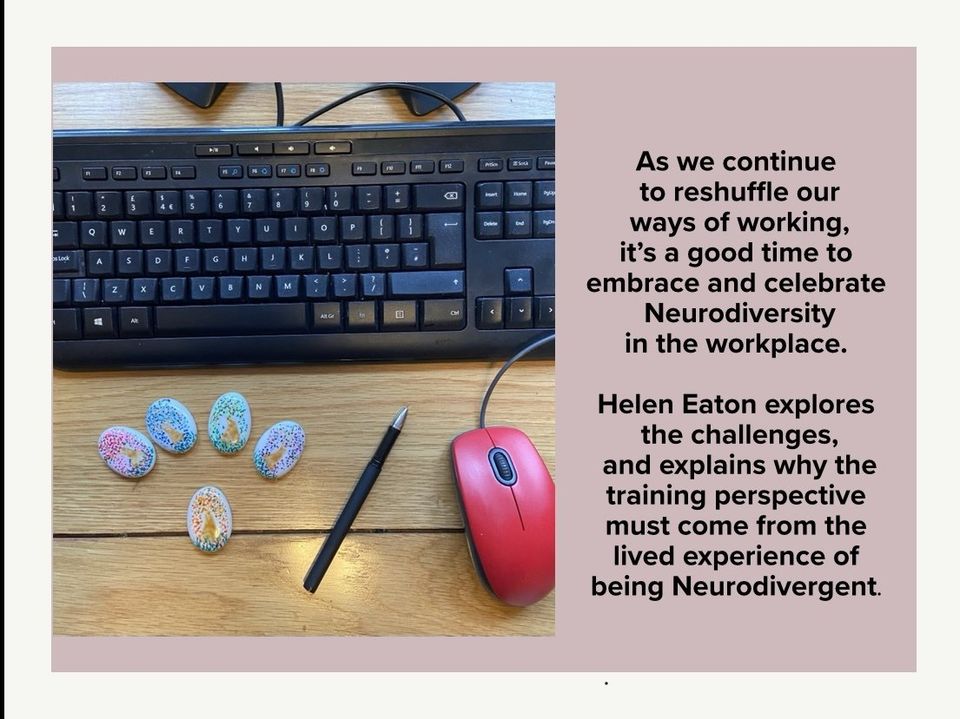Neurodiversity Training - the lived perspective
Helen Eaton • December 14, 2020
Neurodiversity Training - the lived experience perspective

Neurodiversity - the lived experience training perspective
As we continue to reshuffle our ways of working, 2021 is a good time to embrace and celebrate neurodiversity. Not only would this unlock high-powered potential in the workplace, but it also encourages organisations to identify and support individuals’ needs. Organisations are slowly recognising that some of the world's most creative and inventive people are neurodivergent.
The global charity ‘Made by Dyslexia’ features some great celebrity profiles, including the actors Keira Knightley and Orlando Bloom, sharing that they feel that their differences have contributed to their successes. The actor Daniel Radcliffe speaks openly of his Dyspraxia, as do the environmentalist Greta Thunberg and the naturalist Chris Packham of their Autism. The singer Will.i.am celebrates his ADHD, and so the neurodiverse celebrity list continues... Cara Delevingne, Cher, Whoopi Goldberg, Justin Bieber, Billie Eilish...
Other than Walt Disney and Richard Branson, Neurodivergent business leaders are harder to name, as they are quite rightly under no obligation to publicly disclose their diagnoses.
Celebrities aside, organisations such as SAP, Dell, Vodafone and JP Morgan are actively seeking neurodiversity within the workplace. Fortune Magazine ran an article in December 2019 with the headline ‘As workers become harder to find, Microsoft and Goldman Sachs hope neurodiverse talent can be the missing piece’ and reported that in Ernst and Young ‘…hiring neurodivergent employees is seen more as a business model and not a single initiative.’
I have first-hand experience of working with countless organisations in a leadership trainer capacity, but also hear stories from the marvellous neurodivergent individuals I encounter on a daily basis. It saddens me to report that neurodivergent employees in the UK continue to face misunderstanding, often being overlooked and excluded from the workplace. There is an urgent need for greater understanding, as we're at risk of neglecting their potential, overlooking their needs and have a legal duty to support them.
Neurodiversity training and awareness must come from the lived experience and successful lives perspective, rather than take the medical approach of implied deficiencies. By doing this we can celebrate what can be done and how best to do it, rather than focus on what can't be done.
Defining Neurodiversity
The word is used to recognise the different ways of thinking, processing information or experiencing the world, which is usually due to developmental differences in the brain. Neurodiversity includes Autism, and the Specific Learning Difficulties (SLDs) of Attention Deficit Hyperactivity Disorder (ADHD), Dyslexia, Dysgraphia, Dyspraxia and Dyscalculia. Don’t worry, I cover these in more detail later!
Gauging the actual figures for representation in the general population is tricky, due to non-diagnosis, misdiagnosis and the use of private referrals. It’s estimated that at least 1 in 10 people are affected by an SLD, the National Autistic Society reports there are over 700,00 Autistic people in the UK and the US Centre for Disease Control gives an autism rate of 1 in 54 .
The diagnoses
Anything medical requires a clear definition for consistency, however defining neurodiversity in terms of differences and difficulties completely obscures the strengths and joys of neurodiversity. I detail the different diagnoses here, but remember each person is affected differently, and still retains their own unique personality, experience and skill set.
All of these diagnoses may overlap in terms of difficulties, and lead to some communication and executive functioning difficulties (staying organised and remembering the day-to-day stuff). There may also be multiple diagnoses making it tricky to know the root cause of a particular difficulty.
Autism
is defined as a lifelong developmental condition. An Autistic person may struggle, to varying degrees, with social communication and interactions; understanding social rules and behaviours and predicting what is expected. They will have a strong need for routines and may hold specific interests or detailed memory recall. They may struggle with processing sensory information and adapting to change and transitions, particularly if there's no good purpose or reason.
Flipping all of that you may have someone who is confident working alone or engages with others with purpose; who isn't constricted in their thinking by social constraints; who knows there stuff inside out and back to front with a phenomenal eye for detail; or someone who is consistent in their effort and approach to tasks.
Many Autistic people with full and successful lives and careers are often hiding or masking their daily struggles, and have had to learn effective coping mechanisms. The coping strategies are often used to deal with how the world expects them to behave and function, and comes from pressure to conform and fit-in. Some Autistic people may need care throughout their lives because they also have additional disabilities and learning difficulties.
ADHD
is a behavioural condition that makes it hard to concentrate on the boring stuff and control energy, actions and impulses- great assets in some workplaces! Medication is sometimes used to support chemical imbalances.
The four SLD's give rise to particular challenges, which indicate a different way of processing information in the brain and shape how someone interacts with the world around them. Adaptations and assistive technologies can help, but the difficulties are lifelong.
Dyslexia
means difficulties with the range of skills needed for reading and spelling, along with memory and language processing.
Dysgraphia
is a difficulty with the physical act of writing and transferring thoughts and images to paper.
Dyspraxia
is development disorder which affects fine and gross motor skills, which are needed for everyday tasks and movements. The person may appear clumsy or uncoordinated, with poor hand-eye co-ordination.
Dyscalculia
means people may struggle to understand maths concepts, sequences, time and measurement.
The workplace
It’s important to recognise that there are real challenges to embedding support within organisations right now.
• Not every neurodivergent person has a formal diagnosis. Getting one involves several appointments, lengthy waiting lists, and is issued by a multi discipline team including a clinical psychologist. It’s all based on reported and observed behaviour, so is by its very nature subjective and a bit hit-or-miss.
• They may not wish to disclose their diagnosis or challenges, and so may be constantly masking their difficulties in the workplace.
• They may be unaware that they are neurodivergent. As remarkable as this sounds, many adults diagnosed much later in life report then feeling "Oh, now it all makes sense!"
In order to navigate these challenges, the focus shouldn’t be on who has what diagnosis. Instead recognise and appreciate the benefits of a Neurodiverse workforce as a whole, whilst fully utilising everyone’s strengths and differences. Aim to develop an organisation wide supportive environment and remover barriers to recruitment, roles and career progression.
Changing organisational perspectives may be your greatest challenge. Ignorance of the facts, misinformation and a general sense of Neurodiversity just not being a priority are all too common. Invest in training that looks at the lived perspective of Neurodiversity, not just a medical model of disabilities.
The legal duty
The Equality Act requires employers to make reasonable adjustments for workers with disabilities, physical or mental health conditions, to ensure they are not substantially disadvantaged when doing their jobs. This applies right from the start and so includes the recruitment and selection process. The neurodivergent person may have a very strong sense of how they best work , and what adjustments are necessary. Please remember a one size fits all approach absolutely won't work.
It's common for the Neurodiverse to struggle with low self-esteem, anxiety and the need to constantly mask or hide their behaviours in order to fit in. Many may be seen as quirky or have unusual interests. This also sadly means that they may become the butt of jokes or disproportionately subject to bullying and harassment.
Working successfully
As a manager or colleague utilise an open mind, a strengths-based approach and work together to establish effective communication terms and boundaries. Think about the importance of specialisms, flexible working environments, and the ability to flourish outside of typical boundaries.
Over recent months many organisations have had to get creative with their working arrangements and the technology use. Apply that creative, solution-focused thinking to Neurodivergent employees and you could be recruiting and retaining some absolute super stars.
Through her work, Helen Eaton (MSc, BA, PGCE) has gained a fascinating insight into both education and the workplace. She combines over 20 years’ experience delivering management training to the UK’s leading IT and Finance companies with a passion for education and a teaching qualification. Now specialising in Neurodiversity, she has worked with many families and professionals, promoting the importance of understanding and supporting Autism and Specific Learning Difficulties. Most importantly, she has a Neurodivergent family and rejoices in the uniqueness of their minds.
Training services www.hke-training.com
Neurodiversity information www.heleneaton.co.uk
Contact : info@heleneaton.co.uk

For years I had the feeling that the message I was supposed to be delivering wasn’t quite right. I would see in management books and training materials the team themes of work together, socialise, share everything, become one unit, engage and connect . Whilst training team leaders on management programmes, I would hear time and time again complaints about team members who weren’t considered to be sufficiently social. Comments such as: “He won’t come to the pub for a few drinks after work.” “She never joins in when there’s a birthday to celebrate." “I hardly notice they're there sometimes." “She looks irritated when people pop over for a chat when she’s working, but always interrupts others and says the wrong thing.” “He’s rude!” Let’s be clear. Social interactions are hard work. Knowing what to say, in the right way, at the right time and to the right person takes a lot of focus and energy in people whose brains haven’t developed in a typical way. Autistic brains function differently, and a key feature of the lengthy diagnosis procedure is identifying social difficulties. This means Autistic people won’t always respond in expected ways or prioritise their own or other people’s social needs. Every Autistic person has social difficulties – it's part of the diagnostic criteria. It’s a good time to mention there are millions out there who are Autistic but haven’t been diagnosed or even recognise that fact themselves. The challenges and behaviours are present with or without a letter of diagnosis. The pattern and manifestation of these social difficulties varies. There’s a scale from the person who shuns all but essential contact to the Autistic extrovert who constantly seeks social contact. Remember that social contact includes not just conversations and relationships, but text messages, attending meetings, sending a greetings card, answering the phone to strangers, tweeting, buying something in a shop, and greeting a family member. The Shunner and the Extrovert The Shunner may intensely dislike social contact and believe that they really don’t need small talk and companionship to function effectively. They may, however, have been so rejected by society that they’ve abandoned being social. It you’re a little bit quirky, rejection can come from all directions and be overwhelming. From passing comments, glares when things are said out of turn to direct insults and declarations of weirdness. We can be seen to get it wrong through over-sharing, unacceptable words, unexpected emotions or mis-timing when to speak. We may sound different, perhaps monotone or with irregular pacing of words and sounds. Society today really can slam down hard and fast on those who don’t quite fit in. Society quickly forgets that it’s those who didn’t quite fit in and worked to a different set of boundaries that have created some of the world’s most important inventions and who continue to innovate at the highest levels. At the other end of the scale is the Extroverted Autistic. They might step forward for every social engagement, be the first to arrive and the last to leave, but there’s a good chance they’re not quite getting it right. Socialising requires some very fast and very complex processing by the brain. Simply responding in the right way to “Hello” requires these steps, plus a whole lot more things that the Autistic brain isn’t great at: -Recognition a message has been directed at you -Processing of the sound into meaning -Identifying the person through facial features, location, smell and sound etc -Identifying the threat level from tone, body language and environment -Deciding an appropriate response -Process the emotions of the situation -Positioning the body, face and vocal chords to deliver the reply appropriately -Prepare to deal with the response Put all of that into a party situation and the difficulties escalate exponentially. Who to talk to? Where to sit? What to laugh at? What to say? What not to say? How to say it? When can I escape? Autistic people are often constantly struggling with sensory input, such as lighting, the feel of clothes and everyday smells. Most are running on constantly high anxiety levels, perhaps in a state of alert or mild panic, with thoughts and worries churning around their minds. Social interaction adds to the heavy load they are already processing. Some manage this well, others don’t. Social anxiety is crippling, and it goes way beyond just shyness. If something is hard, takes a lot effort and isn’t always rewarded we may avoid it and become anxious at the thought of doing it. If it’s something we’re forced to do or persuaded ourselves to attend, having social anxiety increases the chances of getting the interactions wrong. Ways to help in the workplace as a manager or colleague: -Remember that many people come to work to do a reasonable job, get paid and go home. Not everyone wants to be a social superstar. If they’re meeting targets and no-one’s complaining so all’s fine -Think about the social demands you’re placing on the team or your colleagues. Are they necessary or just making you feel good? -Encourage comfortable and positive social interactions and events that make people feel good about themselves. Being made to build and then fall off a raft into a freezing lake, hold hands with colleagues on an assault course, and then cram fully dressed into a hot tub with 9 other people to celebrate ‘being the best’ was not the most enjoyable experience of my career to date. -If they’re not managing basic interactions, such as responding on time or going to meetings, explain why these things are important and find out what adjustments could be made to help -Be prepared to give time for them to make decisions over social requests. Explain what’s expected and don’t force things if the answer’s no. -Model appropriate social behaviour. Do you greet everyone in a way that makes them comfortable? How do you respond when interrupted? What emotions are your facial expressions leaking? We don’t have to be emotionless in the workplace but oversharing can be exhausting for everyone. -Autistic people often have unusual obsessions and hobbies, as their brains are often great in specialising and over focussing. Show an interest and don’t judge. The most recent hobbies I’ve come across include ancient Greek Gods, the history of Samurai weapons and road kill taxidermy. -Signpost to HR, Occupational Therapy or a GP if you think the person is becoming overwhelmed by their social anxiety at work -And finally, find a quiet, comfortable low stress time to ask the person what can best help them. Don’t’ make assumptions, as they may well surprise you with the simplest of things that could help. Always remember that what is socially important to you may not be important to somebody else. They're not wrong, just different. Through her work, Helen Eaton (MSc, BA, PGCE) has gained a fascinating insight into both education and the workplace. She combines over 20 years’ experience delivering management training to the UK’s leading IT and Finance companies with a passion for education and a teaching qualification. Now specialising in Neurodiversity, she has worked with many families and professionals, promoting the importance of understanding and supporting Autism and Specific Learning Difficulties. Most importantly, she has a Neurodivergent family and rejoices in the uniqueness of their minds. Training services www.hke-training.com Neurodiversity information www.heleneaton.co.uk Contact : info@heleneaton.co.uk
